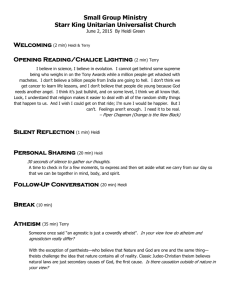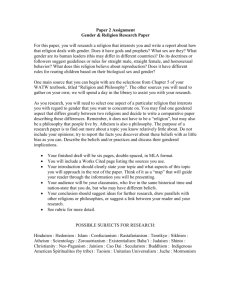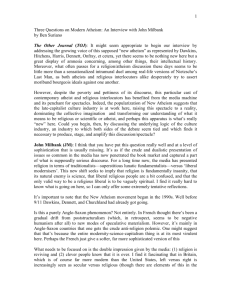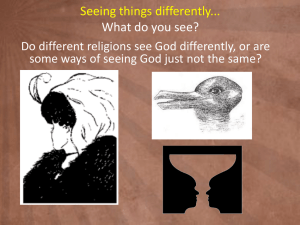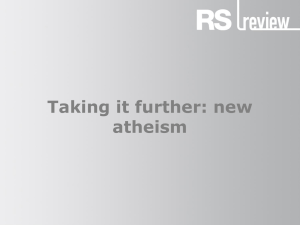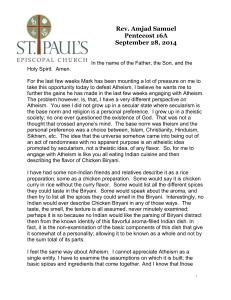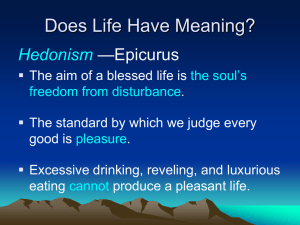VARIETIES OF ATHEISM What is analytical
advertisement
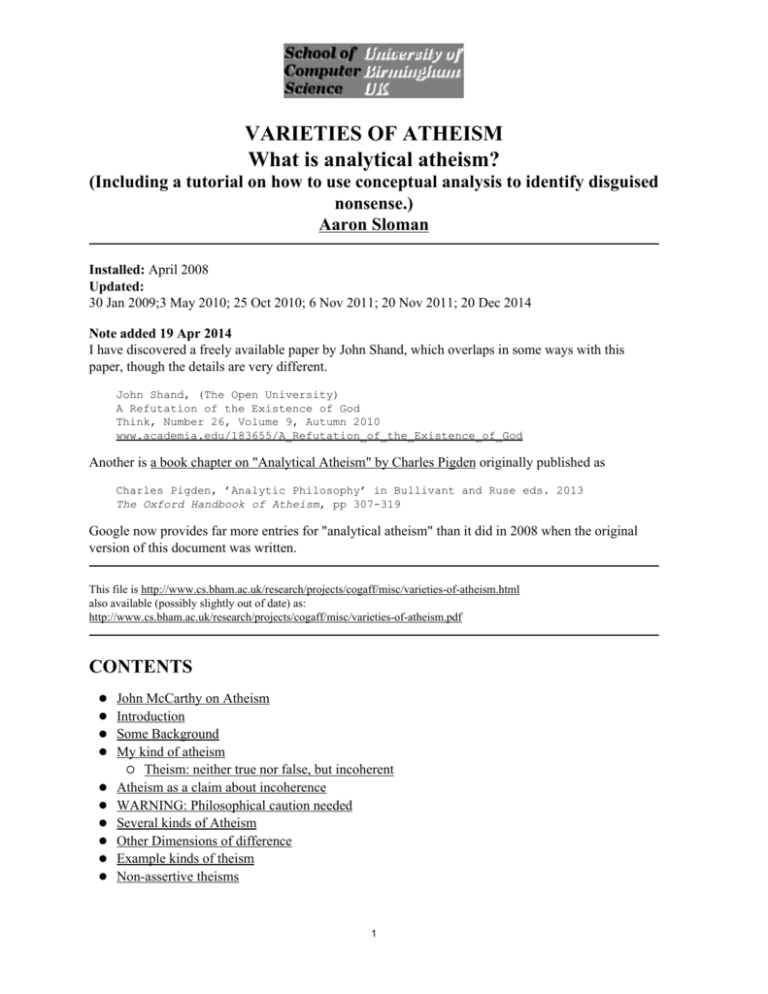
VARIETIES OF ATHEISM What is analytical atheism? (Including a tutorial on how to use conceptual analysis to identify disguised nonsense.) Aaron Sloman Installed: April 2008 Updated: 30 Jan 2009;3 May 2010; 25 Oct 2010; 6 Nov 2011; 20 Nov 2011; 20 Dec 2014 Note added 19 Apr 2014 I have discovered a freely available paper by John Shand, which overlaps in some ways with this paper, though the details are very different. John Shand, (The Open University) A Refutation of the Existence of God Think, Number 26, Volume 9, Autumn 2010 www.academia.edu/183655/A_Refutation_of_the_Existence_of_God Another is a book chapter on "Analytical Atheism" by Charles Pigden originally published as Charles Pigden, ’Analytic Philosophy’ in Bullivant and Ruse eds. 2013 The Oxford Handbook of Atheism, pp 307-319 Google now provides far more entries for "analytical atheism" than it did in 2008 when the original version of this document was written. This file is http://www.cs.bham.ac.uk/research/projects/cogaff/misc/varieties-of-atheism.html also available (possibly slightly out of date) as: http://www.cs.bham.ac.uk/research/projects/cogaff/misc/varieties-of-atheism.pdf CONTENTS John McCarthy on Atheism Introduction Some Background My kind of atheism Theism: neither true nor false, but incoherent Atheism as a claim about incoherence WARNING: Philosophical caution needed Several kinds of Atheism Other Dimensions of difference Example kinds of theism Non-assertive theisms 1 Learning to do conceptual analysis Some additional relevant links John McCarthy on Atheism Added: 6 Nov 2011 "Responding to Richard Dawkins’s pestering his fellow atheists to "come out", I mention that I am indeed an atheist. To count oneself as an atheist one need not claim to have a proof that no gods exist. One need merely think that the evidence on the god question is in about the same state as the evidence on the werewolf question." http://www-formal.stanford.edu/jmc/personal.html Comment by A.S.: Alternatively, one may argue there could not be any evidence for or against an incoherent claim. Introduction William James wrote about varieties of religious experience See http://etext.virginia.edu/toc/modeng/public/JamVari.html but I don’t know of anyone who has documented the varieties of atheism. Unlike James I don’t here attempt to collect data about what atheists say and do, and how they came by their atheism. This is, instead, an analytical paper describing how various sorts of atheistic position can arise in opposition to various sorts of theistic position. Clarity about this could help to make debates about atheism and theism more fruitful. This document attempts to make clear that there are several forms of atheism, of varying ’strength’ in their opposition to theism, and that there are several types of theism to which each type of atheism can be opposed. This means that instead of atheism being just a single viewpoint it covers a multitude of cases, each definable by a type of theism and a type of objection to that form of theism. A slightly curious consequence of this is that a person who accepts one type of theism and is an atheist about another type of theism can be both a theist and an atheist. This is no more inconsistent than admiring some novelists and not others. I first present some background to this discussion note: an exchange that occurred on the PHILOS-L email forum. I then mention a web site on intelligent design in which I described myself as an atheist, and then present the analysis of types of atheism. This helps me to be clearer about the type of atheist I am. Perhaps it will help others also. Some Background On 19th April 2008 I commented on a message that had been posted to the PHILOS-L mailing list with the Subject ’A popish plot?’ asking about the number of high-profile catholics in British or English Analytic Philosophy, giving some examples. I responded making three points: 2 1. As a D.Phil student in Oxford in the 1960s, I had met and interacted with the individuals named, and had generally not found that their catholicism had interfered with their quality as analytical philosophers. 2. I did not think the proportion of catholics amongst prominent analytic philosophers was particularly high. 3. My impression was that most of the well known analytic philosophers were atheists. I also wrote: I was then and remain an atheist (of the kind who doesn’t claim that God does not exist, but that the usual concept when analysed closely is incoherent, so that existence of an instance makes no sense -- is there a standard name for that sort of atheism?). That question provoked some comments, most on the list, and available here, in the thread "A popish plot?" http://listserv.liv.ac.uk/cgi-bin/wa?A1=ind0804&L=philos-l After a few comments had been posted, the moderator of PHILOS-L requested that further discussion be transferred to the Chora list, available here: http://listserv.liv.ac.uk/cgi-bin/wa?A1=ind0804&L=chora I don’t subscribe to Chora, as I already get far too much email. My kind of atheism I had previously mentioned atheism in connection with teaching of ’Intelligent Design’ in this discussion note: http://www.cs.bham.ac.uk/research/projects/cogaff/misc/teaching-intelligent-design.html I recommended allowing scientists to teach ID alongside evolutionary theory as part of an education in how to evaluate theories with competing explanatory claims. In order to make my own position clear I stated in that document: "I have been an adamant atheist since I was about 10 or 11 years old, growing up in Southern Rhodesia (where I was born in 1936). I had no direct exposure to World War II (which started when I was about three years old in 1939 and ended in 1945 when I was nearly nine), but I was very conscious of it as a result of the newsreels that were always shown in the supporting programmes at the ’bioscope’ as we called the cinema then, to which I went once or twice a week. I also sometimes listened to wireless news (’Daventry calling’ from the BBC) saw newspaper headlines, and heard adults talking about the war. There was some rationing, a trench was dug in the main town park, and there were airmen stationed in our town. We had no television then. I don’t recall exactly what convinced me that there was no god -- whether it was the news of the horrors on all sides of the war, whether it was the fairly obvious emptiness of the occasional perfunctory religious observances of my (Jewish) family or the hymn-singing and fatuous praying that started each day at school, whether it was the immorality of a god described as instructing a man to sacrifice his son on an altar (even if it was only a cruel hoax, to test his faith), whether it was something I read, or just the complete lack of any evidence for anything remotely like the good, all 3 powerful, all knowing, loving god alleged to be listening to prayers of people on both sides of every conflict. It was obvious that god could not be on both sides of such murderous conflicts, which implied that at least one side must be deluded in claiming that he was on their side. If one side could be wrong, why not both, since neither had better arguments than the other for the existence of their god?" At that age I think I thought I understood what people were claiming to believe, and was convinced there was no good evidence for its truth, and much evidence for its falsity. NOTE: I later discovered that Epicurus had presented very similar arguments over 2000 years ago, and David Hume more recently. Gradually, especially after I began to learn about philosophy and especially the techniques of conceptual analysis (which I attempted to document in Chapter 4 of The Computer Revolution in Philosophy, and briefly summarise below) I began to realise that my atheism was somewhat different from what many atheists seemed to be expressing. Theism: neither true nor false, but incoherent In particular, whereas many atheists seemed to be discussing the adequacy of evidence for or against the existence of god, I had come to recognize that there could not be such evidence, since the very notion was incoherent. What does ’incoherent’ mean in this context? There are different sorts of incoherence, but the types I am concerned with all involve producing a statement or claim that for some reason cannot be true and cannot be false either. Here is an example: The universe is moving in a north-easterly direction at three miles per hour, but the motion cannot be detected because all measuring devices take part in the same motion. Why is this incoherent? Because (a) the notion of ’the universe’ includes everything that exists, including everything that can move and space itself, (b) the notion of something moving (in any direction at any speed) presupposes some fixed entities relative to which the motion can be measured. Consequently if everything is moving in a certain direction there cannot be anything relative to which things are moving. So the notion of everything moving undermines its own presuppositions and is therefore incoherent. (This is part of the core of Einstein’s special theory of relativity.) There is a more subtle incoherence because the notion of moving in a north-easterly direction makes sense only when applied to something moving on or relative to a location on the surface of the earth, where the four compass directions are defined. North-east will be different for different locations on earth. So it makes no sense to say that the whole earth or the solar system, or our galaxy, let alone the whole universe, is moving in a north-easterly direction. Further examples of incoherence are given below.) The discovery of the incoherence of the theist position, and some variants of its denial is a special case of something that has happened several times in the history of philosophy, as follows: 4 -- Some thesis is put forward with apparent supporting arguments. -- Then an opposing thesis is presented also with apparent supporting arguments. -- Later, it is gradually realised, at least by some of those involved in the debate, that it is an endless debate that can never be resolved -- because it involves propositions that appear to be capable of being true or false, but which can never be either because they are either too lacking in specificity or incoherent, sometimes in unobvious ways. There are many examples of statements which appear to be intelligible when first encountered, but which one can learn to see are incoherent. The statement about motion of the whole universe is an example. Another example comes from Wittgenstein: we know what it means to say that is now 5pm in London, or 5pm in New York. So it may seem obvious that we understand what it means to say that it is 5pm on the sun (or at the centre of the Earth, or in another galaxy). But closer analysis shows that a presupposition of talking about what time it is at location X, is that the sun (usually the sun of our solar system, though it could be the sun at the centre of some similar planetary system) has an angular elevation that changes at that location. But the sun cannot have an angular elevation at the sun, or at the centre of the earth etc. So not all statements of the form "It is now Xpm at location Y" are capable of being either true or false. That is not immediately obvious until one has learnt to analyse preconditions for the applicability of concepts one uses. There are many examples of such disguised nonsense in the history of philosophy. Atheism as a claim about incoherence As I came to understand the nature of such examples I gradually also came to realise that my atheism was not like the denial of the existence of a unicorn. Rather I had reached the conclusion that most of the forms of theism that I had encountered, including standard forms of Jewish, Christian, and, I suspect, Muslim theism, are as incoherent as the claim that it is now 5pm at the centre of the earth. I.e. theists make claims that can neither be true nor be false, because they are incoherent claims. I shall call the theory that theistic claims cannot be true and cannot be false because they are incoherent "analytical atheism", because it is arrived at by conceptual analysis. For now I am more concerned with clarifying the difference between that kind of atheism and more common kinds of atheism and agnosticism, than with producing arguments for any of the positions. When I recently tried, using google, to find examples of other people putting forward what I call analytical atheism, my search revealed little though that may be simply because I did not look hard enough. An example that comes close is this: http://atheism.about.com/od/argumentsagainstgod/a/Contradictory.htm Gods’ Contradictory Characteristics: Making God Impossible to Exist Austin Cline, How Credible is God, Theism, When the Characteristics are Contradictory? 5 Note, however, that being self-contradictory implies being false. So this statement: This table is made entirely of rubber and this table is not made entirely of rubber is logically contradictory and is therefore false, according to our standard understanding of ’and’. It has a truth value, which is independent of how things are in the world. That is not the same as being incoherent and incapable of having a truth value, as in this statement: This table is made entirely of days of the week. Another example There is a book review that raises the topic of incoherence of theism, but does not clearly distinguish theism being self contradictory (and therefore necessarily false) and being incoherent (and therefore neither true nor false): http://findarticles.com/p/articles/mi_qa3803/is_200604/ai_n16431010 Netland, Harold A "Why There Is Something Rather Than Nothing". Trinity Journal. Spring 2006. FindArticles.com. 24 Apr. 2008. Review of: Bede Rundle. Why There Is Something Rather Than Nothing. Oxford: Oxford University Press, 2004. 204 pp. $45.00. "Theism is rejected, not simply because the evidence for God’s existence is unpersuasive (which he believes), but more fundamentally because the concept of God itself is incoherent." [I have not read Rundle’s book.] I have heard some extremely intelligent and well known thinkers (including Daniel Dennett) being interviewed about their atheism and the answers they gave were different from mine, so perhaps not many people have noticed the possibility of analytical atheism. In the remainder of this paper I shall try to make more precise what the thesis is that I refer to as "analytical atheism" and what the alternatives to it are. Producing and evaluating all the best arguments for and against the thesis and showing that this atheistic thesis is correct, or at least better supported by arguments and evidence than any of its rivals, would require a much longer document. WARNING: Philosophical caution needed Some people sincerely believe that if a proposition makes sense to them, that proves that they know what they mean and also proves that it cannot be incoherent. Readers who are tempted by that view need to be aware that it can take a complex and unobvious argument to show that some set of propositions is logically inconsistent even if there are people who believe they are all true. Showing that a collection of propositions that appear to make sense cannot form a coherent whole, because some of them undermine the presuppositions of others, can also take a complex and unobvious argument. The existence of such a proof of incoherence is perfectly compatible with many people feeling they understand something coherent by that set of propositions. Compare the five year old child who was asked where a fast racing car and a slow moving van would meet if they simultaneously started moving towards each other after starting some distance apart. His answer was to point at a location nearer the starting position of the racing car. When asked why he sincerely answered: "it is moving faster so it will get there sooner". 6 He was not ready to understand his own confusions. Adults can be in the same state. Training in analytical philosophy can help them to recognize and get over some of their own confusions. Being able to discover that some of one’s thoughts are nonsensical requires a kind of intellectual development, which for many people can be very difficult if they have not studied analytical philosophy. NOTE: Learning to think philosophically does not always lead to clear thinking. Whereas some people fail to realise that thoughts that feel meaningful can include hidden contradictions or be incoherent, others who appreciate the need for constraints on meaningfulness propose the wrong constraints. For example "concept empiricists", and their modern re-inventors, defenders of "symbol grounding theory" propose overly strong criteria for thoughts to have meaning, e.g. that all the concepts used must have been derived from experience, or must be "grounded" in definitional links to sensorimotor relationships. For a discussion of this error see http://www.cs.bham.ac.uk/research/projects/cogaff/talks/#models Why symbol-grounding is both impossible and unnecessary, and why theory-tethering is more powerful anyway. Several kinds of Atheism (or Anti-theism) Below I specify different kinds of rejection of theism, which define different sorts of atheism (or anti-theism). The specific kind depends not only on the kind of rejection, but also on what is being rejected. There are different sorts of theism and to each one of them there can correspond several varieties of atheism. Not all varieties of theism are incoherent in the way I shall attempt to define. For example, Einstein sometimes claimed to be religious and to accept a kind of God, but, in saying that, he was not referring to the usual kind of Judeo-Christian type of God, but to some deep features of the natural world that make it awe-inspiring even to a hard-headed scientist. He was not endorsing more common kinds of theism, or religious belief. For more on Einstein’s views and how they are sometimes distorted by theists, see http://www.cs.bham.ac.uk/research/projects/cogaff/misc/einstein-religion.html In order to define various kinds of atheism we need to specify various kinds of theistic thesis. Different subsets of those theses are accepted by different theists (and different religions). It should be obvious therefore that there will be different atheistic (or anti-theistic) positions, denying the truth of different combinations of theistic claims. For each theistic position, TS, defined by the conjunction of a set S of theistic propositions, we can define the following six anti-theistic views more or less strongly opposed to TS: A1. Agnosticism about TS This can have different forms, e.g.: 1. An individual claims he does not know whether TS is true or false 2. An individual claims he (or humans) will never be in a position to know whether TS is true or false. 3. An individual claims that it is completely impossible, for humans or anything else, to know whether TS is true or false 7 A2. Mild atheism about TS: The claim that the evidence/arguments against TS are stronger than the evidence/arguments supporting TS. A3. Weak atheism about TS: The claim that TS is probably false, or almost certainly false, e.g. because there is far more convincing evidence against TS than evidence for TS. A4. Strong atheism about TS: The claim that TS is definitely false, based on assessment of empirical evidence and philosophical or scientific arguments about the best available explanations of phenomena some version of theism attempts to explain. A5. Logical atheism about TS: This is the claim that the propositions in TS form a logically inconsistent set so that their conjunction must be false. A typical example of this would be the claim that these three propositions are mutually contradictory: 1. Evil exists 2. God is omniscient 3. God is omnipotent 4. God is perfectly good A6. Analytical atheism about TS: The claim that TS is incoherent and incapable of being either true or false in any possible universe, e.g. because some of the content of the theistic claims undermine requirements for the claims to be meaningful. The differences between Strong Atheism about TS, Logical Atheism about TS and Analytical Atheism about TS not always noticed, and the positions are consequently confused. I am not claiming that there are always sharp distinctions between these cases -- there may be atheists whose views straddle two or more of these cases. It should be clear from this that for every different set of theistic propositions, TS, there will be (at least) six different atheistic (or anti-theistic) positions that can be held, according to the schemata presented above, A1(TS) A2(TS) A3(TS) A4(TS) A5(TS) A6(TS) four of which treat the theistic position as saying something that might conceivably be true and might be false, and the sixth one, A6(TS), analytical atheism about TS, stating that TS is incoherent and therefore cannot be either true or false. Note that, as explained above, this is a stronger criticism than the claim that TS is contradictory and therefore necessarily false. I am an analytical atheist, in the sense of A6, about various sets of theistic propositions, discussed below. This should not be read as a claim that I am dogmatically or irrevocably committed to A6. 8 Unlike most theists I always accept the possibility that I shall later find that my views are mistaken -as has happened in the past, when I have changed my mind on some philosophical or scientific question. E.g. I may one day find that theism can have additional flaws not listed above. Or I may learn that there is some variety of theism that I have never encountered (or have encountered but failed to understand) that comes very close to the types of theism I have summarised here but is neither self-contradictory nor incoherent. This is one of the main differences between scientific or philosophical atheists and religious theists: the latter typically will not even admit that it is possible that they are mistaken, and in some cases try to make a virtue of having faith that is not backed up by evidence or reason. Educating children to have closed minds of that sort is thoroughly unethical and can be compared with foot-binding. I have called it mind-minding, since it constrains intellectual development, leaving minds permanently immature -- stunted mental growth. This is a cause of much harm that people do to one another in the name of religion. It is for that reason that state-funding should never be used to support faith-schools. Other Dimensions of difference Apart from the six different attitudes towards a theistic position TS listed above, we can also introduce a distinction between having a view without being aware of it, and having a view that one is aware of. If we use AW(X) to mean ’being AWARE of X’ and UW(X) to mean ’being UNAWARE of X’, then we can roughly indicate that each of the six atheistic positions splits into two cases being Aware of ... AW(A1(TS)) AW(A2(TS)) AW(A3(TS)) AW(A4(TS)) AW(A5(TS)) AW(A6(TS)) being Unaware of .... UW(A1(TS)) UW(A2(TS)) UW(A3(TS)) UW(A4(TS)) UW(A5(TS)) UW(A6(TS)) Between the extremes of being fully aware of one’s attitude to TS and being fully unaware of one’s attitude (like an infatuated lover whose infatuation is obvious to all his friends but not to him). It is also possible to distinguish differences between the reasons why people hold a position or whether they have reasons. I am fully aware of being an analytical atheist in relation to some common varieties of theism AW(A6(TS)), and I have reasons for that, indicated elsewhere in this paper. Example kinds of theism I do not claim to have encountered all the multifarious kinds of religion and associated theological theories to be found on this planet. So the list of theistic propositions below is merely illustrative, not definitive. The important point is that for each type of theism there is some set of propositions all of which or some subset of which are accepted as true by the adherents. For any such subset there will be six corresponding varieties of atheism represented by replacing TS with a label for that set of theistic propositions in each schema above. 9 What follows illustrates the sorts of theistic theses, various subsets of which, at least in the communities I have encountered, are commonly regarded as characterising religious beliefs. There is something or someone, often referred to as God, who created everything that exists, including himself who is a person with personal capabilities such as caring, wanting, suffering, intending, loving, listening, understanding, who is all knowing (there is nothing he does not know) who loves all humans who loves all animals who is perfectly good who is the source of all goodness who is not responsible for the evil in the universe who was responsible for the words in the bible, or the Koran, or .... who listens to the prayers of those who believe in him and takes action to make their prayers come true (well, in some cases at least). who chooses certain representatives to tell others what they are supposed to believe or do who came to earth in human form who alone can provide the salvation that all humans required whose nature is incomprehensible to humans without whose existence the universe would have no purpose belief in whom is a requirement for finding life worth living for whom everyone has a deep need, whether acknowledged or not (sometimes referred to as "a God-shaped hole" in every human) whom humans will encounter directly in an after life (or at least some humans at least) who wants humans to kill people who deny his existence, or who do not act according to his will, or who offend those who believe in him, (etc.) who will inflict eternal and terrible torment on sinners That is not offered as a comprehensive list of theistic statements. Other kinds produced by religious believers of various sorts can be added to that list. Different theists will accept different subsets of those assertions. Some may accept none of them: there are many kinds of religion and many kinds of theism. I suspect there are mystical kinds of theism for which all the above statements are far too simple and definite. The main point here is that for each kind of theism, as long as its adherents put forward some set of statements TS that they regard as true, there will be in principle (at least) the six possible forms of atheism about TS. If a theistic doctrine says nothing true or false, but merely consists of exhortations to act in certain ways, or to take up certain attitudes of awe or reverence or respect to the universe, or some portion of it (which is how R.M.Hare characterised his religious belief in the 1960s), then none of the above forms of atheism is relevant. Of course, other forms, opposing the exhortations, are possible. (I shall extend the list of theistic propositions, and possibly the list of types of atheism, from time to time. Suggestions welcome.) 10 Originally there were only five types of atheism on my list, until searching literature on atheism made it clear that types 5 and 6 needed to be distinguished. Many people seem to have noticed type 5, without noticing type 6. Different subsets of that list can be taken to define different sets of theistic propositions, TS1, TS2, TS3, ..... For each subset, TS, there will be different kinds of Atheism, e.g. A1(TS) A2(TS) A3(TS) A4(TS) A5(TS) A6(TS) I am not claiming that these are the only varieties of atheism. There may well be views or theories that are opposed to kinds of theism but do not fit any of the above formulae. My main concern here is to indicate how A6 differs from other forms of atheism. Non-assertive theisms So far, having talked to or listened to different sorts of theists at various times over many years, I have learnt that many of them accept some combination of the above theses that can be shown to be incoherent either individually or as a set. The other theists make more or less vague statements about their attitudes to life, or their sense of mystery or awe about the universe, or they utter prescriptions about how people should live. But they don’t claim to be saying something that is true. Sometimes they don’t even try to convince others that they should believe or accept anything: i.e. they are not evangelical at all. We could call them ’non-assertive’ theists. Nothing written here implies that what non-assertive theists say is incoherent. (It may, in some cases, be perfectly coherent, but ethically objectionable.) My ’personal’ tutor while I was a student at Balliol College in Oxford working for a DPhil on philosophy of mathematics was Richard Hare, who was a non-assertive theist. I am not an analytical atheist about non-assertive theists. I just don’t care to join them, in their claims, prescriptions, rituals, etc. Learning to do conceptual analysis Detecting incoherence of the sort I have been talking about requires the ability to do conceptual analysis. Unfortunately a normal school syllabus will not, as far as I know, teach students to do conceptual analysis, even though it is a most important skill. Usually, learning to do it requires a degree in philosophy, with a strong component of analytical philosophy. However it is possible for people to teach themselves. In 1978 I published a tutorial on conceptual analysis in Chapter 4 of The Computer Revolution in Philosophy, now available online here. However, many readers will find that quite heavy going. Clear thinkers probably have a natural talent for learning how to do it if they have not been exposed to too much intellectual mush in their education. It possible to get the idea by working on a few relatively simple examples before starting on the really 11 difficult conceptual analysis tasks, such as trying to clarify concepts like "consciousness", "mind", "emotion", "love", "faith", "free will", "good", "bad", "evil", "survival after death", "omnipotence", "omniscience", or "god". One way to start is to consider the following questions. Each of them appears to be asking a question which requests an answer in the form of a proposition. The right answer will be a true proposition -- if there is a right answer. If the question is incoherent, no answers can be true or false. Which flows faster, time or the Mississippi river? Which is the fattest day of the week? How heavy is the number three? Does the tree in my garden grow faster than the Mississippi river flows? What time is it now at the centre of the earth? In which direction is the Universe moving? Does the universe weigh more at the north pole than at the equator of the earth? Who will be the first person to create a 3-D Penrose triangle? (NB: not just something that looks like a Penrose triangle -- Richard Gregory did that long ago -but something that is how the Penrose triangle looks.) How many grains of sand know that three plus two equals five? How many rain clouds should a scientific theory contain? What does the wind hope to achieve when it blows clouds? How angry can a cloud get at being blown off course? Who made the number six bigger than the number five? What was the last thing that happened before the beginning of time? Which day of the week cares most about humanity? Who is the tallest employer in New York who employs every individual in New York that is not self-employed and employs nobody else? Is the answer to this question true or false? How big does a circle have to be in order to have three corners? Who made the number ninety nine? Did the universe create itself on a Tuesday? Who will build a tower in the next fifty years that is twice as tall as the tallest tower built in the 21st century? How long would it take to create a catalogue of all and only the catalogues that have ever existed or will exist that do not list themselves? Which colour of the rainbow is the heaviest? After how many weeks does a fertilised human embryo acquire free will? How big was the first animal produced by biological evolution? Since every human sperm is a potential human, isn’t it wrong to allow their potential to go unfulfilled? At precisely what stage is a foetus conscious? At precisely what stage does a foetus become a human being? What is it like to be a fertilised egg? What is it like to be a Tuesday? After having practice explaining to yourself what is wrong with those questions (preferably comparing your answers with answers given by friends or colleagues) try a few more. 12 Who or what made the universe? Why would an all powerful, omniscient, perfectly good creator of the universe allow humans and other animals to suffer terrible pain and die horrible deaths? Why should something commanded by God be good? Why should something forbidden by God be bad? If God made everything why is he not responsible for the existence of tyrants and torturers? Why is it better to believe something you have been told to believe than to believe things for which you can find strong supporting evidence and only weak counter evidence? If it is not wicked for God to allow his creatures to be murderers and rapists why is it wicked for human parents to let their children be murderers and rapists? If it is not wicked for God to allow people to be killed by tornadoes, volcanoes, earthquakes, and droughts, does that mean it is not wicked for humans to allow people to die when their deaths can be prevented? I think there are various sets of theistic statements, including the sorts of statements that are accepted by christian, jewish or muslim believers, which form incoherent sets. As far as I can tell, Buddhism does not include that sort of incoherence. So I am an analytical atheist about standard forms of christianity, judaism and islam, but not about Buddhism, at least not the forms of Buddhism I have heard explained. The notion of conceptual analysis has hidden depths. I have tried to uncover some of them here: http://www.cs.bham.ac.uk/research/projects/cogaff/misc/logical-geography.html Two Notions Contrasted: ’Logical Geography’ and ’Logical Topography’ Variations on a theme by Gilbert Ryle: The logical topography of ’Logical Geography’ Some additional relevant links 1. Margaret Knight on: Morals without religion Margaret Knight gave a talk on "Morals without religion" in the early 1950s pointing out the ignorance and stupidity of such views, in the BBC woman’s hour radio programme, and created a storm of protest. She then wrote an excellent little book about the episode Morals without religion 1955. Note added 19 Oct 2010 See: http://tinyurl.com/morals-knight Texts of the two BBC talks. http://en.wikipedia.org/wiki/Margaret_K._Knight http://www.secularism.org.uk/uploads/moralswithoutreligion.pdf http://www.secularism.org.uk/uploads/christianitythedebitaccount.pdf 2. Note added 30 Oct 2014: requirements for natural selection. http://www.cs.bham.ac.uk/research/projects/cogaff/misc/entropy-evolution.html Discusses conditions under which evolution as we know it (or its results) could occur in a physical world, in part refuting arguments that the second law of thermodynamics demonstrates the need for a creator. 3. Note Added 2 Mar 2011: The Brights Organisation This organisation may be of interest to people with an atheistic/agnostic/naturalistic bent: http://the-brights.net/ 13 What is a bright? A bright is a person who has a naturalistic worldview A bright’s worldview is free of supernatural and mystical elements The ethics and actions of a bright are based on a naturalistic worldview I don’t intend to go round saying "I am a bright" (it’s enough to be a philosopher/scientist), though I largely sympathise with what they are doing. 4. "The British Humanist Association" I thought the wording of their "Bendy Bus" campaign was rather silly, suggesting that humanists/atheists are selfish and irresponsible, though I approve of most of what they stand for. Contrary to the slogan on the buses, there’s plenty to worry about, even if there is no God, though not as much to worry about as the possibility of an all powerful, all knowing god ultimately responsible for all the dreadful things we see. 5. A book about "Making God" by an atheist: Ann Long, Making God: A New Materialist Theory of the Person, Imprint Academic, 2007 God.html http://www.imprint.co.uk/books/Making God.html A well written mixture of philosophy of science, philosophy of religion, philosophy of mind, from an unusual standpoint. I have not yet read it all. 6. Why Intelligent Design theory should be discussed in schools, alongside the Ptolemaic theory, Phlogiston theory, the Flat Earth theory and others: http://www.cs.bham.ac.uk/research/projects/cogaff/misc/teaching-intelligent-design.html 7. A comment on this page by Armin Shams Baragh, which has now disappeared, was previously located at: http://www.cs.man.ac.uk/~shamsbaa/second.html It referred to "Aaron Sloman’s God", as if I had a god. This is a common strategy used by theists. However, there is no such thing as "Aaron Sloman’s God". But the page does give a link to this page so readers can easily find out exactly what I wrote. So there is no deliberate deception. Anyone who wishes to criticise the incoherent concept of God should not point the finger at me, but at the priests, theists and other believers who specify that that’s the sort of God they believe in and worship. (BBC Radio 4’s regular religious slots provide plenty of examples of this sort of incoherent theism -- along with unctuous self-righteousness and a recurring tendency to refer to what "we" need, or think, or feel, or want, without any evidence of research backing up the generalisations made!) What I criticise as incoherent is not my invention but the type of concept of god that I have heard put forward by others, mainly in the Jewish/Christian and possibly (though I am not so sure) Muslim traditions. As noted above, this criticism of incoherence need not apply to all religions and in particular it does not apply to the forms of Buddhism that I have encountered. There may be other forms that avoid the criticism. Good luck to the proposers: they may have some need for such a concept. I don’t. 14 I have no interest in looking for an improved concept of god -- there are enough other tasks to keep me busy for a few more centuries (like trying to understand the evolutionary origins of human mathematical competences, and the forms of virtual machinery found in animals and artefacts). If someone else finds a significantly improved god-concept, no doubt I’ll hear about it. Though I don’t expect it to be of any importance for the things that concern me. 8. Added 20 Dec 2014 Gert Korthof’s web site discussing evidence for and against Darwinism includes this: http://wasdarwinwrong.com/korthof96.htm God, Hitler and the Free Will Defense It comes close to a form of analytical atheism. NOTE added 20 Nov 2011 BBC religious broadcasts: A lot of muddled thinking goes unchallenged in BBC religious broadcasts, e.g. claims that everyone needs some form of religion, that it is impossible to have moral standards without religion, and other completely unsubstantiated generalisations uttered by unctuous religious representatives are frequently presented by priests and others, without any warning by the BBC that their views need to be taken with a pinch of salt. [TO BE CONTINUED] Maintained by Aaron Sloman School of Computer Science The University of Birmingham 15
